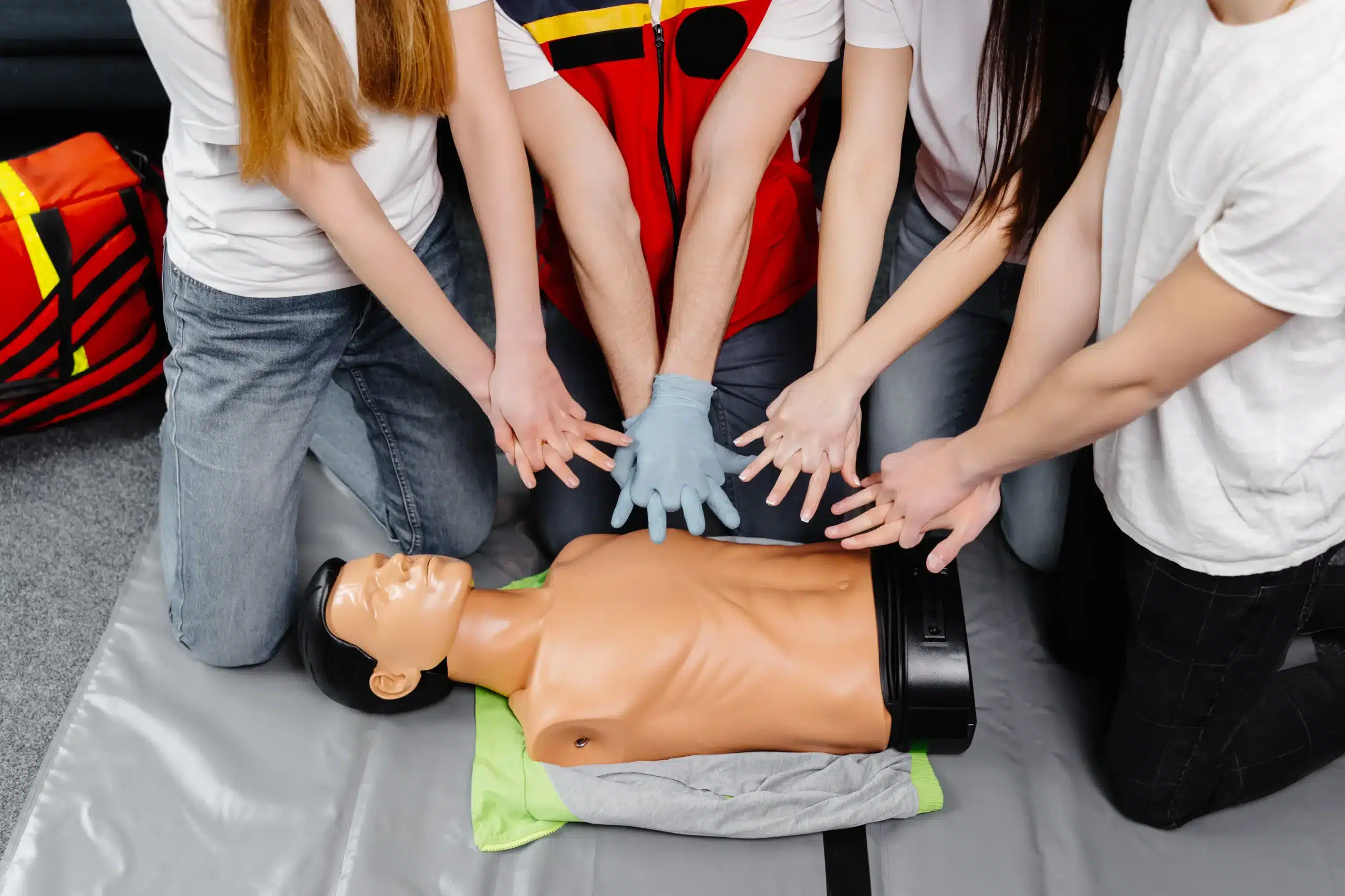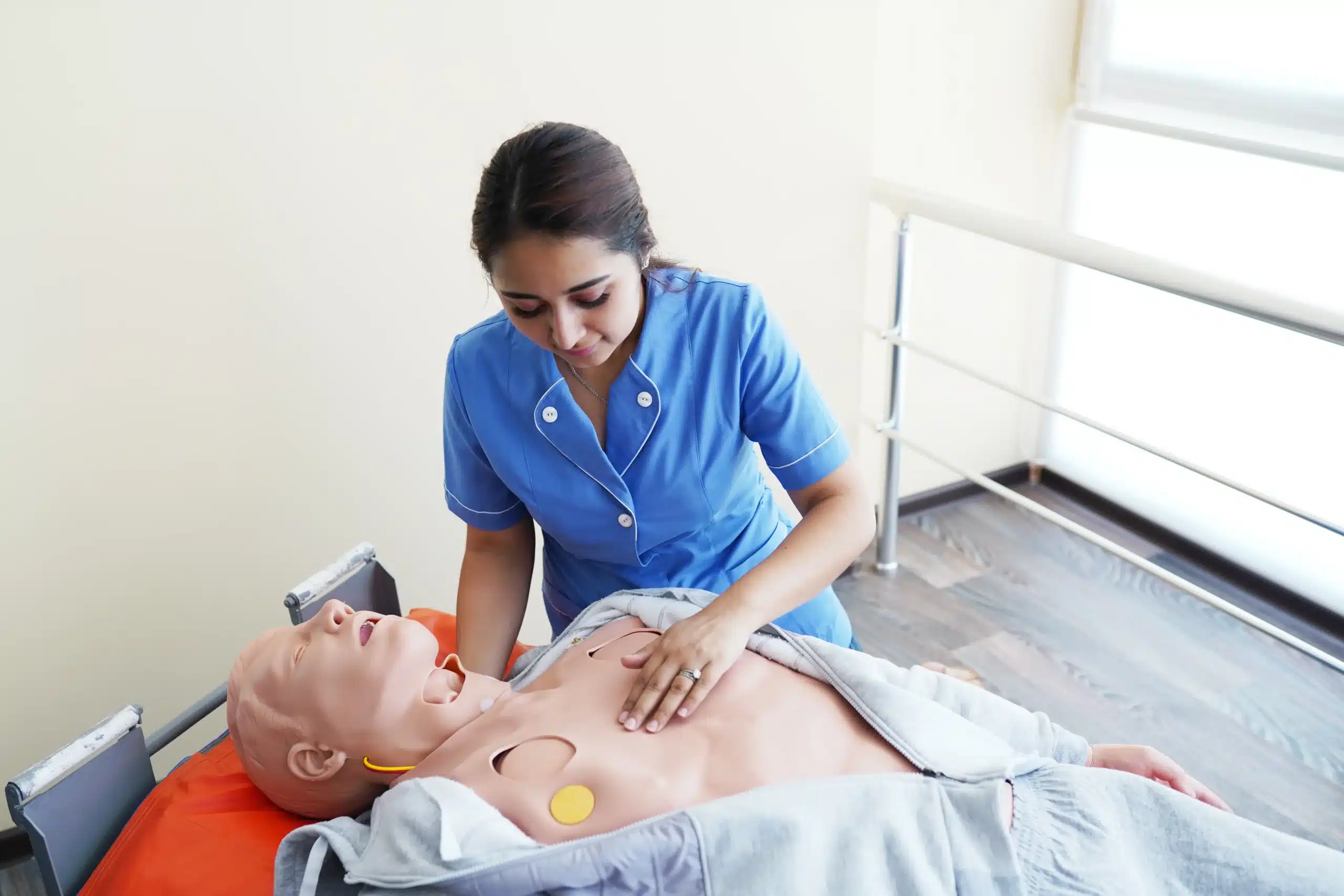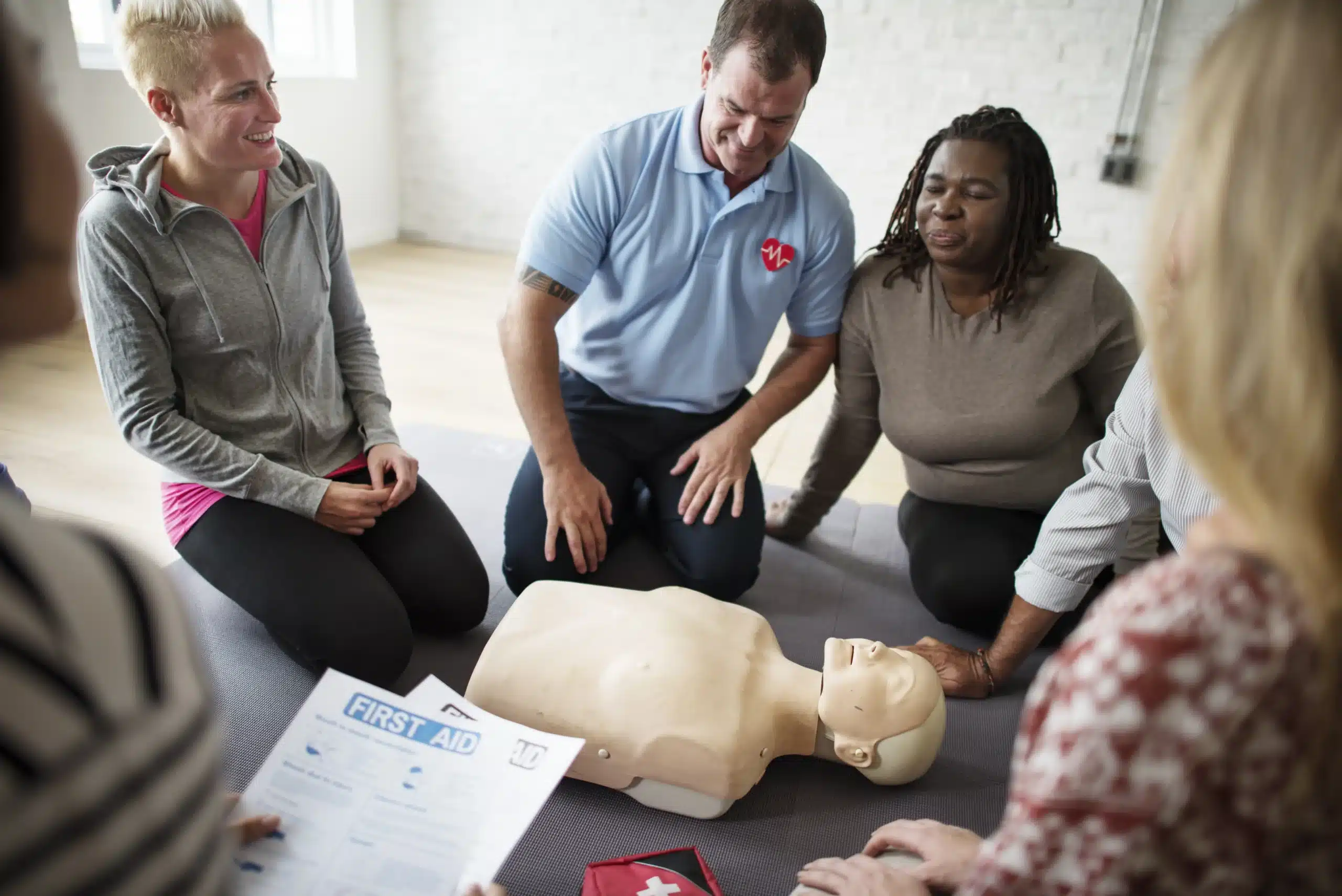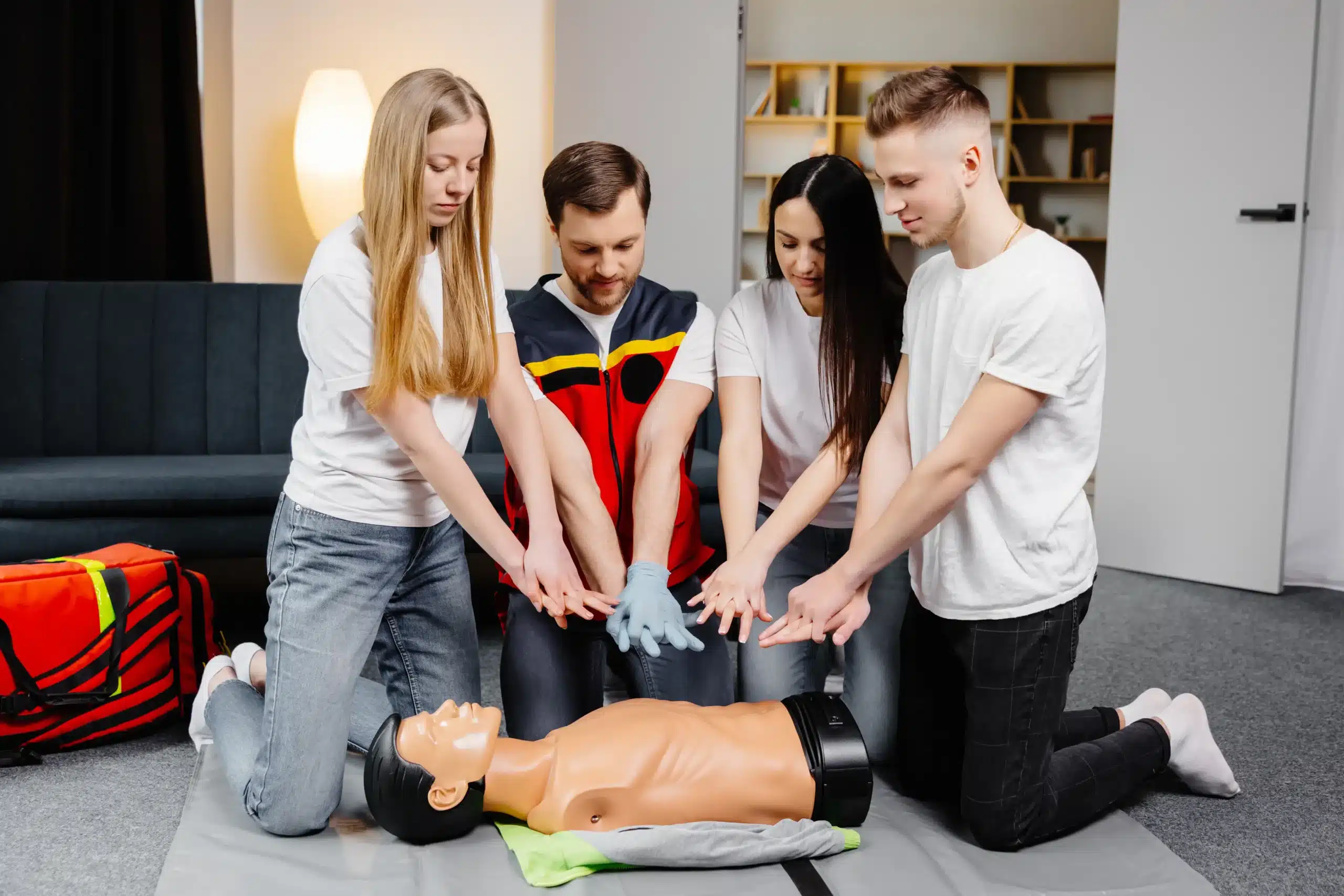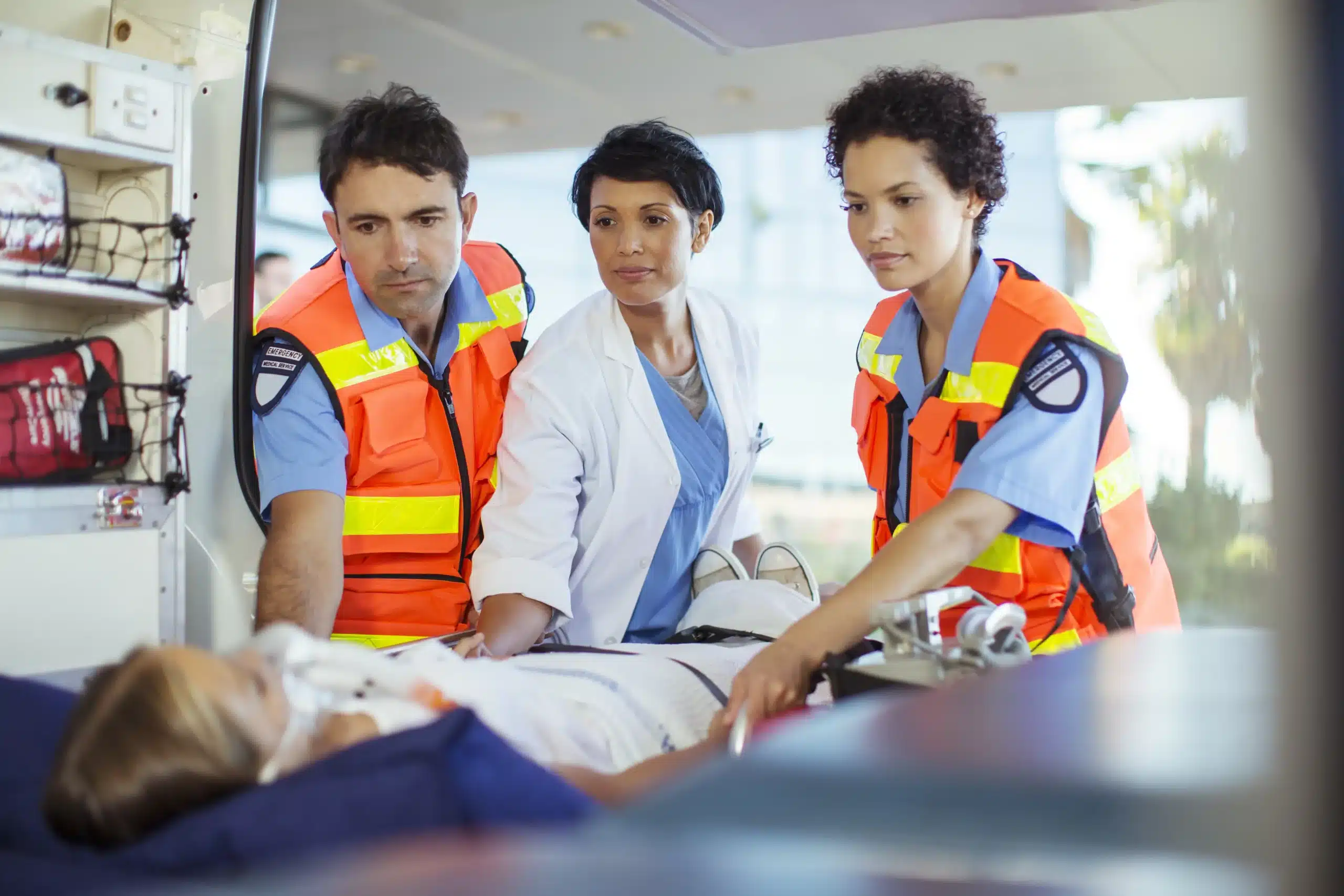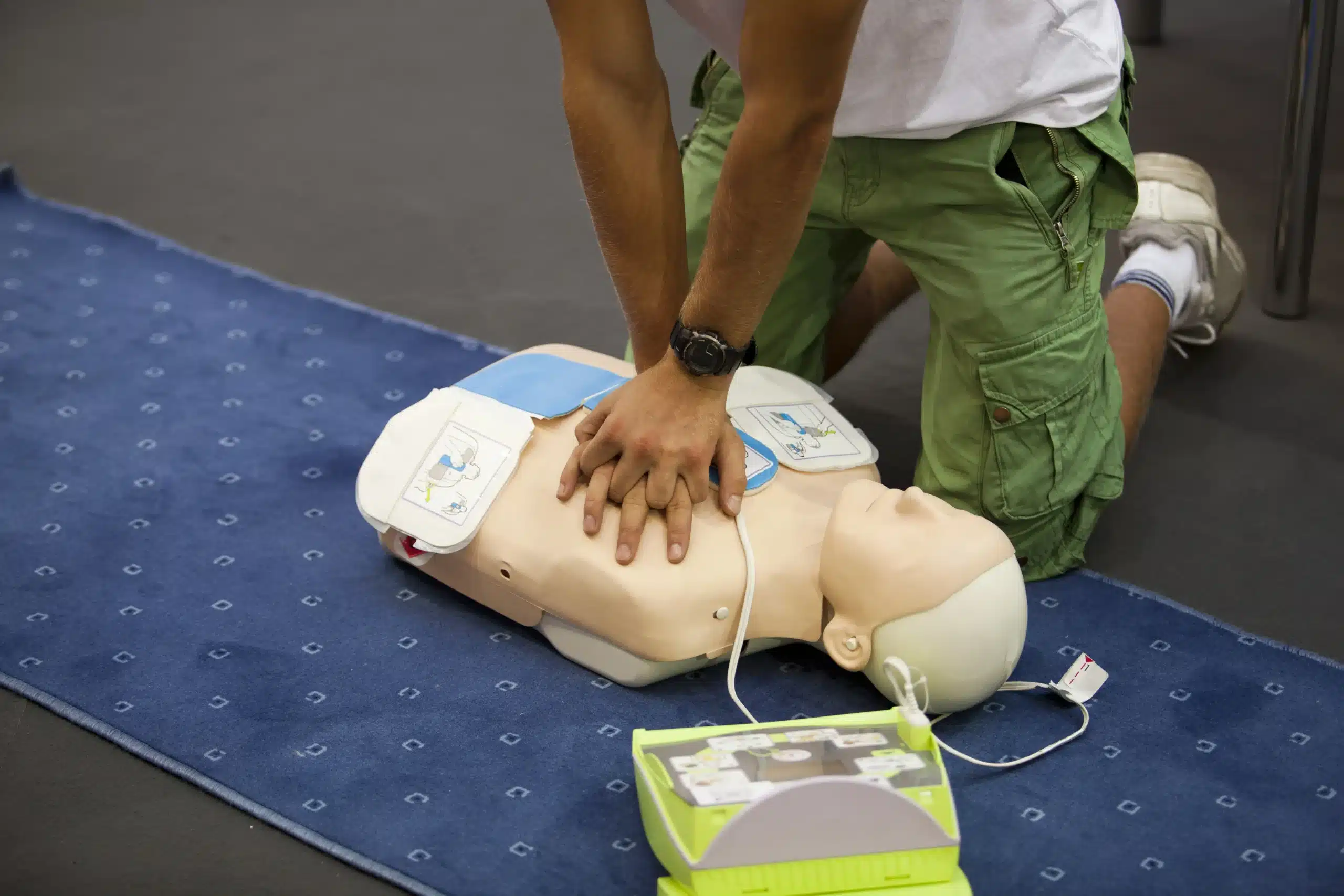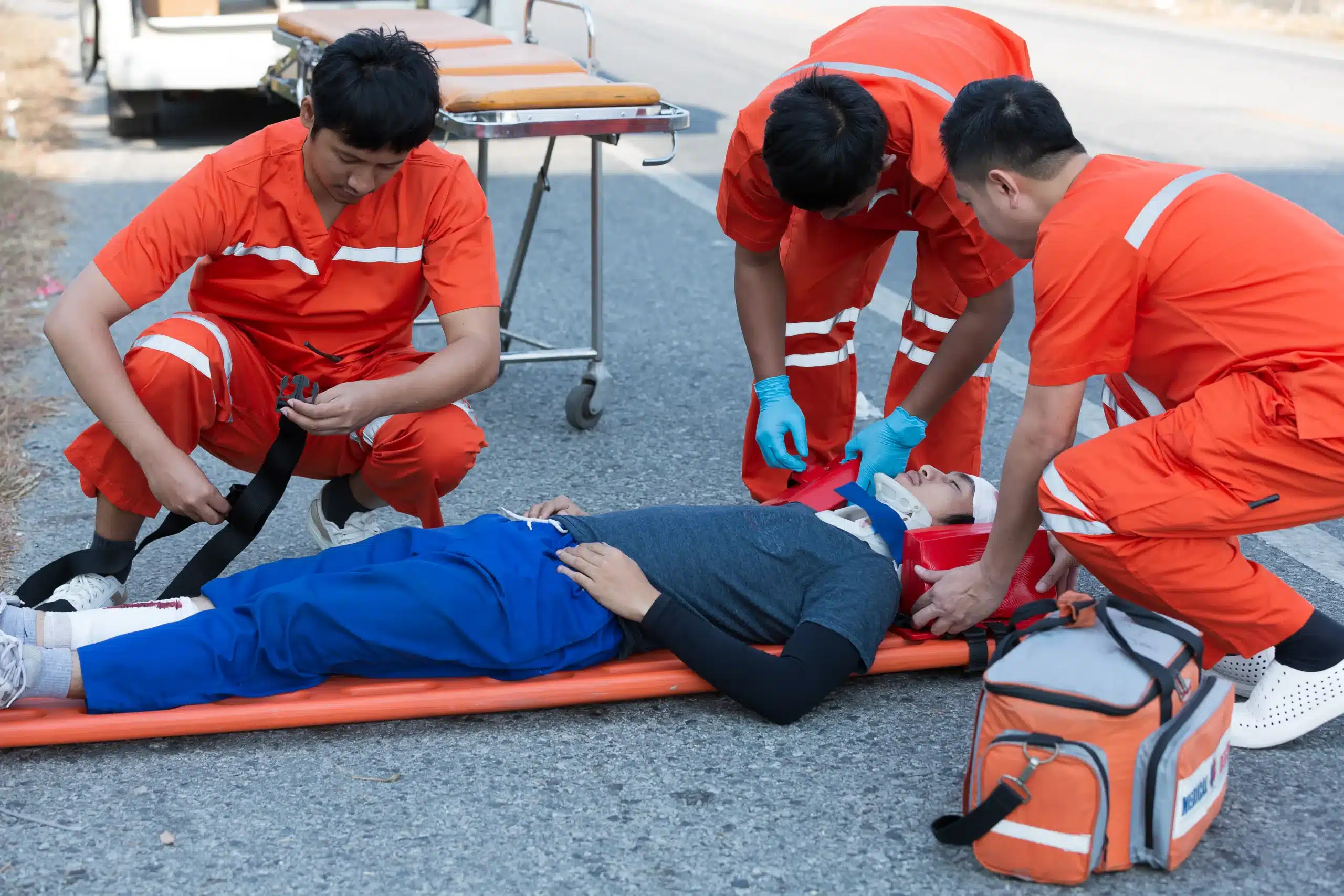In a medical emergency, seconds can matter. CPR can literally be the difference between life and death, and knowing how to perform it effectively is a powerful skill. This comprehensive guide covers everything you need to know about CPR certification, including how to find a ‘CPR certification near me’. We’ll explore the various types of CPR courses, discuss the benefits of getting certified, and address common misconceptions that might be holding you back. We’ll also delve into what to expect during a CPR class, how to prepare, and how to maintain your certification. Whether you’re looking to fulfill a job requirement, enhance your resume, or simply gain the confidence to help in a crisis, this post will provide you with the information you need.
Key Takeaways
- CPR certification is a powerful tool: Equipping yourself with CPR skills allows you to respond effectively to emergencies, potentially saving lives. Find a course that suits your needs and remember even hands-only CPR can make a difference.
- Select the right CPR course: Consider your career goals, schedule, and budget when choosing a course. Explore options like blended learning and group discounts to make training more accessible. Dublin CPR Classes offers various courses to meet your specific requirements.
- Stay current with your CPR skills: Maintain your certification and keep your skills sharp by renewing your training every two years. Regularly refresh your knowledge and consider advanced certifications to enhance your life-saving abilities.
What is CPR Certification?
CPR certification means you’ve completed a course and demonstrated the skills to perform cardiopulmonary resuscitation. It’s a valuable credential, showing you know how to respond to cardiac arrest and other breathing emergencies. You don’t technically need official certification to perform CPR in an emergency, but taking a CPR course ensures you’re properly trained and confident in your abilities. It equips you with the knowledge and practice to administer CPR effectively, increasing the chances of a positive outcome. CPR classes cover essential techniques like chest compressions, rescue breaths (if appropriate), and how to recognize the signs of a cardiac arrest.
Why Life-Saving Skills Matter
CPR can truly be the difference between life and death. Effective CPR from a bystander can double or even triple a person’s chance of survival during cardiac arrest. Those critical moments before professional medical help arrives are crucial. Learning CPR empowers you to take immediate action, potentially saving a life. It also helps dispel common misconceptions about CPR and first aid, giving you the confidence to act quickly and correctly in a crisis. Think of it as a vital skill, not just for helping strangers, but also for protecting your loved ones.
Who Needs CPR Certification?
CPR certification is beneficial for everyone, but it’s especially important for those in healthcare, childcare, or professions involving public safety. Medical professionals, healthcare providers, nurses, doctors, and others in healthcare settings often require CPR certification for their jobs. Those working with children, like childcare providers, educators, coaches, and camp counselors, also benefit greatly from CPR training. Other professions where CPR certification is valuable include construction, human resources, and personal training. Even if it’s not mandatory for your job, having these life-saving skills can make you a valuable asset in any workplace or community. Dublin CPR Classes offers group discounts, making it more affordable for workplaces to train their teams together. Consider checking if your employer offers CPR training or look into options for individuals in Dublin, Livermore, and San Ramon.
Find CPR Certification Courses Near You
Finding the right CPR certification course means understanding what’s available. Let’s explore your options:
American Heart Association (AHA)
The American Heart Association offers a wide range of CPR courses designed for everyone from healthcare professionals to concerned citizens. These courses give you the skills and knowledge to perform CPR effectively, covering everything from the basics to advanced life support. AHA certification is widely recognized and respected.
American Red Cross
The American Red Cross also provides CPR training in several formats, including in-person classes, online modules, and a blended learning approach. While online-only courses are convenient, they often don’t meet requirements for workplace certifications. If you need certification for your job, choose a course that includes an in-person skills check.
Local Training Centers
Local training centers, such as Dublin CPR Classes, offer convenient, in-person CPR and first aid training. Our courses focus on certifications from recognized organizations like the AHA, ensuring you receive high-quality training. Check out our CPR and first aid classes in Dublin, CA—we serve Dublin, Livermore, and San Ramon. We’re proud to offer low prices and excellent customer service. We also offer group discounts, making training more affordable for workplaces or groups.
Online Certification Options
Online CPR certification courses offer flexibility, allowing you to learn at your own pace. These courses are a great way to brush up on your skills or learn the basics, but hands-on practice is essential for truly mastering CPR. While some online courses offer certification, confirm they meet your workplace requirements, as many employers require in-person skills checks. For a quick and convenient online certification, look into the American Heart Association’s RQI program. You can also browse our directory of CPR resources in Northern California for more training options.
Types of CPR Certification Courses
Knowing which CPR certification is right for you can feel overwhelming. This section breaks down some popular options to help you choose the best fit. Dublin CPR Classes offers a range of courses to meet your specific needs. Check out our low price guarantee and group discounts to make training even more accessible.
Basic Life Support (BLS)
The Basic Life Support (BLS) course provides the essential skills for responding to cardiac emergencies. Designed for healthcare providers, BLS focuses on high-quality CPR, including chest compressions and rescue breaths. It also covers AED use, team dynamics, and other critical life support techniques. BLS certification is often a requirement for many healthcare professionals.
Heartsaver CPR
Geared toward the general public, Heartsaver CPR covers the basics of CPR and how to use an AED. This course is perfect for anyone who wants to be prepared for emergencies, even without a medical background. Think teachers, coaches, parents, or anyone who wants to learn these valuable skills. We offer classes in over 60 cities, making it easy to find a course near you.
Pediatric CPR
Pediatric CPR courses focus on the specific needs of infants and children. They teach how to recognize and respond to pediatric emergencies, including CPR techniques adapted for smaller bodies. These courses are especially relevant for childcare providers, parents, and anyone who regularly interacts with children. Our convenient RQI program offers a blended learning approach for online certification.
Advanced Cardiovascular Life Support (ACLS)
Advanced Cardiovascular Life Support (ACLS) is an advanced course for healthcare professionals who manage cardiovascular emergencies. Building on the foundation of BLS, ACLS covers advanced interventions, cardiac arrest management, and effective teamwork in high-pressure situations. Our Dublin, California location serves the surrounding areas, including Livermore and San Ramon.
What to Expect in a CPR Course
So, you’ve decided to get CPR certified—fantastic! Knowing what to expect can help you feel prepared and confident going into your class. Here’s a breakdown of what a typical CPR course at Dublin CPR Classes entails:
Course Duration and Format
CPR courses typically run between two and four hours, depending on the specific type and level of certification. We offer a range of options to fit your schedule, including weekday and weekend classes. You can choose from a traditional classroom setting or blended learning, which combines online coursework with in-person skills practice and testing. For convenient and efficient certification renewal, check out our RQI program.
Key Skills You’ll Learn
In a CPR course, you’ll learn the essential skills to respond to cardiac arrest and other life-threatening emergencies. This includes recognizing the signs of a heart attack, providing high-quality chest compressions, delivering rescue breaths (if appropriate for the course level), and using an automated external defibrillator (AED). You’ll also learn how to recognize and respond to choking. Our BLS courses cover additional skills like two-rescuer CPR and using a bag valve mask.
Hands-on Practice and Scenarios
Hands-on practice is a core component of any good CPR course. You’ll practice your skills on realistic training mannequins, allowing you to develop the muscle memory and confidence needed to perform CPR effectively in a real emergency. Many courses incorporate realistic scenarios and simulations to help you apply your knowledge. This practice is invaluable for preparing you to respond calmly and efficiently under pressure.
Certification Exam Process
Most CPR courses conclude with a written and practical skills test where you demonstrate your CPR technique on a mannequin. Successfully completing both earns you your CPR certification, valid for two years. Dublin CPR Classes adheres to the American Heart Association guidelines, ensuring your certification is widely recognized. We also offer group discounts for businesses and organizations.
How Much Does CPR Certification Cost?
CPR certification is an investment in life-saving skills, and naturally, you’ll want to understand the associated costs. Pricing depends on several factors, including the type of course, your location (CPR class costs in Dublin, California, will differ from those in other areas), the training provider, and whether you choose online, in-person, or blended learning.
Average Price Range
Generally, CPR certification costs between $75 and $120. This typically covers online coursework, skills testing, and your official American Heart Association (AHA) certification card. You can find BLS CPR classes for around this price, which gives you a good benchmark. Remember that prices can change, so it’s always best to check directly with your chosen provider. For those specifically looking for training in the Tri-Valley area, our Dublin CPR classes offer competitive rates.
Group Discounts and Special Rates
If you’re training a team or group, look for providers offering discounts. Many organizations, including Dublin CPR Classes, offer reduced rates for group CPR training, making it more cost-effective to equip your entire organization with these essential skills. This can significantly lower the per-person cost, making CPR training accessible to more people.
Financial Assistance Options
Concerned about the cost? Explore blended learning CPR courses. These combine online learning with in-person skills practice (check if your state allows this format) and are often a more budget-friendly option. Blended learning allows you to learn the theoretical aspects at your own pace online, then demonstrate your skills in a shorter, more focused in-person session. Also, remember that renewing your CPR certification is often cheaper than initial certification, so factor that into your long-term planning. Staying current with your CPR certification ensures you’re up-to-date on the latest life-saving techniques.
Choose the Right CPR Course
Finding the right CPR course involves understanding your needs and considering various factors. Let’s break down how to make the best choice for you.
Factors to Consider
When selecting a CPR course, think about your schedule, budget, and learning style. Dublin CPR Classes offers a range of CPR certifications, from basic to advanced, with options for in-person, online, or blended learning. CPR class costs in Dublin can vary based on the certification level, the format, and the training provider. We understand cost can be a concern, so we encourage you to check out our Low Price Guarantee. We also offer group discounts to make training more accessible.
Matching Courses to Career Requirements
While you don’t need mandatory certification to perform CPR, having proper training ensures you can use this technique effectively. However, certain professions require specific certifications. For example, healthcare providers often need American Heart Association BLS certification. It’s important to research the requirements for your specific field. Online CPR certifications may not meet all requirements, especially in regulated fields like healthcare, so confirm what certifications are accepted in your workplace.
Specialized Certifications for Specific Professions
Dublin CPR Classes offers a variety of American Heart Association (AHA) certified courses, including CPR, BLS, ACLS, PALS, and First Aid. We also offer the convenient RQI program for online recertification. If you’re unsure which course aligns with your career goals, our customer service team is happy to help. We serve Dublin, Livermore, and San Ramon, and you can find more locations in our Northern CA CPR directory. Whether you’re a medical student, teacher, or childcare provider, we have a course that fits your needs.
Prepare for Your CPR Class
Getting ready for your CPR class involves a little prep work—both mental and physical. Knowing what to expect and gathering any necessary materials beforehand will make your learning experience smoother and more effective. At Dublin CPR Classes, we want you to feel confident and prepared, so let’s cover a few key points.
Required Materials
Most CPR classes don’t require you to bring much. The training provider will often have everything you need, including the CPR training mannequins. However, it’s always a good idea to check with your specific provider, like Dublin CPR Classes, to confirm their requirements. For example, they may suggest bringing a notebook and pen for notes or a small bag to store your belongings. You can find our contact information and class details on our website.
Pre-course Study Tips
While pre-course study isn’t mandatory for most general CPR classes, familiarizing yourself with the basics can increase your confidence. If you’re aiming for OSHA-compliant certification, an in-person or blended learning CPR class is usually recommended. Dublin CPR Classes offers a variety of courses, including our convenient RQI program for online certification. A little pre-class reading can help you absorb the information more effectively during the hands-on portion of the training.
For those pursuing healthcare certifications like BLS, pre-course study is often more involved. Check with your instructor or the certifying body, such as the American Heart Association, for recommended study materials. Remember, online-only CPR certifications might not meet all requirements for certain professions, so choose a course that aligns with your career needs.
Physical Considerations
CPR classes involve physical activity, primarily chest compressions on a mannequin. You don’t need to be a weightlifter! The instructors will guide you on the proper technique, including hand placement and the appropriate depth of compressions. They’ll also address common concerns like the fear of injuring someone while performing CPR. It’s natural to feel a little apprehensive, but the hands-on practice in a supportive environment will help you build the skills and confidence to respond effectively in a real emergency. Check out our low price guarantee and our group discounts for affordable training options. We serve Dublin, Livermore, and San Ramon, and you can find more locations in our Northern CA CPR directory.
Benefits of CPR Certification
Getting CPR certified isn’t just about checking a box; it’s about equipping yourself with skills that can have a ripple effect on your life and the lives of others. From personal growth to career advancement and community well-being, the advantages are numerous.
Personal Skill Development
CPR certification empowers you with the confidence and competence to respond effectively in medical emergencies. It transforms you from a bystander into a potential lifesaver, ready to provide immediate assistance when every second counts. This newfound ability to act decisively can significantly reduce anxiety and improve your overall preparedness for unexpected situations. Knowing you can make a difference provides a sense of personal empowerment that extends beyond emergency situations. These life-saving skills are invaluable assets in any environment, whether at home, work, or in the community. CPR training equips you with the knowledge and skills to recognize the signs of cardiac arrest and other medical emergencies, allowing you to respond effectively.
Professional Advantages
In many professions, CPR certification is a requirement or a significant advantage. For healthcare professionals, it’s a fundamental skill demonstrating your commitment to patient safety. But even outside the medical field, CPR certification can enhance your resume and open new opportunities. Many employers value employees prepared to handle emergencies, and having CPR certification can set you apart from other candidates. It shows initiative, responsibility, and a dedication to safety—qualities highly sought after in various industries. Plus, staying current with the latest CPR guidelines through regular renewal ensures you’re always prepared to provide the best possible care. Whether you’re a teacher, coach, childcare provider, or in any other field, CPR certification can be a valuable asset to your professional development. Check out our CPR, BLS, ACLS, and PALS courses to find the right fit for your career goals. Our Dublin, California location serves residents of nearby cities like Livermore and San Ramon. See our Northern California CPR directory for more locations.
Community Impact
The impact of CPR certification extends far beyond individual benefits. It strengthens the fabric of our communities by creating a network of trained responders ready to assist in times of need. Effective bystander CPR can dramatically increase survival rates in cardiac arrest cases, effectively doubling or even tripling the chances of survival. By getting certified, you become an active participant in building a more resilient and prepared community. Group discounts make it even easier for organizations and groups to get trained together, fostering a sense of collective responsibility for community safety. Dublin CPR Classes offers group discounts and a low price guarantee, making training more accessible. Consider joining a class with friends, family, or colleagues to build a stronger support network and contribute to a safer environment for everyone. Our convenient RQI program offers quick and easy online certification.
Maintain Your CPR Certification
CPR skills are like any other skill—regular practice keeps them sharp. It’s not enough to get certified just once. Maintaining your CPR certification is crucial for ensuring you’re prepared to act confidently and effectively in an emergency. This section covers everything you need to know about keeping your credentials up to date.
Renewal Timelines
CPR certifications typically expire every two years. This renewal requirement ensures you stay current with the latest CPR practices and guidelines. Don’t let your certification lapse. Mark your renewal date on your calendar and set reminders so you can recertify before it expires. Our RQI program offers a quick and convenient online option for recertification. Dublin CPR Classes serves Dublin, Livermore, and San Ramon.
Continuing Education Options
Even if your certification isn’t due for renewal yet, consider taking refresher courses or exploring continuing education opportunities in Dublin, California. Advanced certifications like ACLS and PALS build upon basic CPR skills and equip you to handle more complex medical emergencies. Continuing your education not only reinforces your existing knowledge but also introduces you to new techniques and best practices, making your life-saving efforts even more effective. Check out our course catalog for advanced training options. We offer group discounts for businesses and organizations.
Stay Updated with Latest Guidelines
CPR guidelines are regularly reviewed and updated to reflect the latest scientific research and best practices. Organizations like the American Heart Association (AHA) and the International Liaison Committee on Resuscitation (ILCOR) collaborate to publish updated guidelines approximately every five years. These updates often include changes to CPR techniques, compression rates, and rescue breathing protocols. Staying informed about these changes is essential for providing the most effective and safe care possible. ProTrainings provides a helpful overview of some of the key updates to AHA guidelines. Dublin CPR Classes follows the latest AHA guidelines in all our courses, ensuring you receive the most current and relevant training. View our CPR directory for Northern California. We also have a low price guarantee.
Debunking Common CPR Misconceptions
Let’s clear up some common misunderstandings about CPR training and certification. These myths can prevent people from learning this life-saving skill, so let’s set the record straight.
“Only healthcare professionals can perform CPR”
One of the biggest myths is that only doctors and nurses can perform CPR. Absolutely not true! Anyone can learn CPR, and in an emergency, bystanders are often the first on the scene. Equipping yourself with these skills means you can make a real difference while waiting for paramedics to arrive. Check out our CPR classes to get certified. We proudly serve Dublin, Livermore, and San Ramon. See our Northern CA CPR directory for more locations.
“CPR always saves lives”
Movies and TV shows often portray CPR as a guaranteed life-saver, but unfortunately, that’s not always the case. While CPR significantly increases the odds of survival, it’s not a miracle cure. Many factors influence the outcome, including the underlying cause of the cardiac arrest and how quickly CPR begins. Even if the outcome isn’t what we hope for, providing CPR is still crucial and can buy precious time until professional help arrives. Learn more about our American Heart Association BLS certification, which covers CPR techniques and other life-saving procedures.
“CPR training is too expensive”
Worried about the cost of CPR certification? It doesn’t have to break the bank. Many affordable options exist, and we’re committed to our low price guarantee. We also offer group discounts to make training even more accessible. Check out our website for more information on pricing and available courses.
“You need to perform mouth-to-mouth breathing”
Hesitant about mouth-to-mouth resuscitation? You’re not alone. Many people are initially uncomfortable with this aspect of CPR. However, hands-only CPR, focusing solely on chest compressions, is highly effective and often recommended for those without formal training. Our courses cover both traditional CPR and hands-only techniques, giving you the confidence to respond effectively in any emergency. Explore our RQI program for convenient online certification options.
Related Articles
- Why CPR is Crucial in Healthcare
- CPR Classes in Dublin: Your Complete Guide – Dublin CPR Classes
- CPR Renewal in Dublin: Find Courses & Discounts – Dublin CPR Classes
- CPR Certification in San Ramon: Your Complete Guide – Dublin CPR Classes
- Find CPR Courses Near Me: Your Certification Guide – Dublin CPR Classes
Frequently Asked Questions
What’s the difference between CPR and First Aid?
CPR focuses specifically on life-threatening breathing and cardiac emergencies, teaching you how to restore blood circulation and breathing. First Aid covers a broader range of injuries and illnesses, from minor cuts and burns to more serious situations like choking or allergic reactions. Both are valuable skills, and many courses combine CPR and First Aid training.
How do I choose the right CPR class?
Consider your specific needs and goals. Are you getting certified for your job, personal enrichment, or to meet specific requirements? Healthcare providers typically need BLS certification, while others may find Heartsaver CPR sufficient. Also, think about your learning style and schedule. Do you prefer in-person classes, online learning, or a blended approach? Dublin CPR Classes offers various options to fit your needs.
What if I’m nervous about performing CPR in a real emergency?
It’s completely normal to feel apprehensive. CPR classes provide a safe and supportive environment to practice your skills and build confidence. Hands-on training with realistic scenarios helps you develop the muscle memory and critical thinking skills to respond effectively under pressure. Remember, any attempt at CPR is better than none.
Is online CPR certification enough?
While online courses offer flexibility and convenience, they may not meet all requirements, especially for healthcare professionals or workplace certifications. Many employers and regulatory bodies require in-person skills testing. Check with your employer or licensing board to confirm their specific requirements. Blended learning courses, combining online learning with in-person skills sessions, can be a good compromise.
How can I make CPR training more affordable?
Look for group discounts if you’re training with colleagues or friends. Many training centers, including Dublin CPR Classes, offer reduced rates for group bookings. Also, consider blended learning courses, which are often more budget-friendly than traditional classroom-based training. Remember that renewing your certification is typically less expensive than initial certification, so factor that into your long-term planning.


